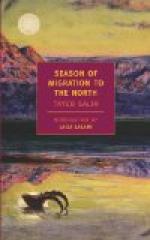At one time the roll-call of one troup of Mounted Police included in its rank and file three men who had held commissions in the British service, an ex-midshipman, a son of a Colonial Governor, a grandson of a Major-General, a medical student from Dublin, two troopers of the Life Guards, an Oxford M.A., and half a dozen ubiquitous Scots. Recently an ex-despatch-bearer from De Wet joined the force at Regina, and although the cold shoulder was turned on him for a day or two, he soon made good. One of the young fellows stretched before us, now going to Fort Smith to round up wood bison, was born in Tasmania, ran away from school at fourteen, sheared sheep and hunted the wallaby, stoked a steamer from Australia to England and from England to Africa, and in the early days of bicycles was a professional racer.
Constable Walker, lying lazily on his back blowing blue spirals into the air, has in the long winter night made more than once, with dogs, that perilous journey from the Yukon to the Mackenzie mouth (one thousand miles over an unknown trail), carrying to the shut-in whalers their winter mail. On one of these overland journeys he cut off the tips of his four toes. His guide fainted, but Walker took babiche and, without a needle, sewed up the wound. On this trip he was fifty-seven days on the trail, during five days of which the thermometer hovered between sixty-two and sixty-eight degrees below.
CHAPTER V
NINETY MILES OF RAPIDS
“On wan dark night on Lac St. Pierre,
De win’ she blow, blow, blow,
An’ de crew of de wood scow ‘Julie
Plante’
Got scar’t an’ run below—
For de win’ she blow lak hurricane
Bimeby she blow some more,
An’ de scow bus’ up on Lac St. Pierre
Wan arpent from de shore.”
—Dr. Drummond.
This morning we are to leave the Island; it is June 12th and Friday. The daylight lengthens from day to day and last night at half past ten underneath the mosquito-bar within the tent, it was light enough to thread a needle. We have mending to do each night, and dragging clothes behind the boat makes a satisfactory kind of progressive laundry. At dusk we had seen an empty scow floating down river, adrift from Athabasca Landing. In the middle of Grand Rapids she broke amidships, but held together until in the darkness she floated beyond our ken.
Trouble of our own awaits us. With no one noting, an adventurous scow, with all her precious cargo, has pulled loose from her moorings. By the time the Cree watchman discovers that the “Go-Quick-Her” has taken the bit in her teeth, the runaway with tail-sweep set has turned the next corner of the Athabasca. Great excitement! Billy Loutit and Emile Fosseneuve borrow the Police canoe and go in chase. It is such a rough bit of water that we hold our breaths, for a false stroke means death to both; but that false stroke does not come. Billy Loutit knows this river as we know the borders and shrubs in our garden-bed.




